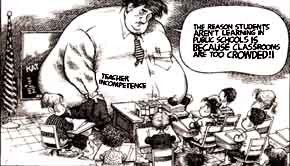|
|
Mona Charen
A nation complacent?
IT HAS BEEN 15 years since we were declared "A Nation at Risk" due to our failing
education system. The national response to the 1983 report was genuine alarm. We
had just endured a deep recession and were bombarded with stories about the
Japanese juggernaut.
Last month, the Third International Math and Science Survey released data showing
that American 12th graders lag behind the entire world -- except Cyprus and South
Africa -- in math and science achievement. Yet, as Bill Bennett put it, the national
response seems to be "Whatever." Have we gone from "A Nation at Risk" to "A Nation
Complacent"?
Though the survey results did evoke alarm from some education experts, parent
organizations and conservative columnists, there was a bored shrug from other
A group of 30 education reformers -- several of them members of the original
commission that issued the Nation at Risk report -- met in Washington last week to
answer that question.
In the first place, it isn't true that our education system is irrelevant to our economy.
Our economy has many strengths -- flexibility, innovation, resilience -- that compensate
for our sclerotic education system. America prides itself, rightly so, on its leadership in
the information economy. But as Floyd Kvamme, a partner at a large firm in California's
Silicon Valley explained, we must import a large number of technically trained people
(23 percent of workers in California's high-tech industries are immigrants) to make the
information sector run. And even with immigration, there are 400,000 high-paying jobs
going begging in Silicon Valley.
Beyond economics, though, the argument for radically altering the education system is
that it is denying to millions of American children -- particularly, but not exclusively,
minorities -- a chance at the American dream.
Milton Friedman once pointed out that capitalism benefits the little guy far more than
the wealthy. Under capitalism, it is ordinary people who get a chance to have their own
possessions, space and leisure. As Friedman said, to the rich, it doesn't matter if they
have hot and cold running water or running servants.
We are a wealthy country that can well afford to ensure that every child, not just the
children of privilege, gets a great education. Yet, the benefits of capitalism do not flow
to the average person when it comes to education because our education system lacks
capitalism's driving engine: competition.
Dr. Checker Finn, president of the Thomas B. Fordham Foundation and a leading
education philosopher, proposed at last week's meeting a list of reforms that would
learn from other nation's successes as well as draw upon our own national strengths.
1) Institute national assessments that would be independent of politics.
2) Pass a charter school law in every state.
3) Eliminate geography as a determinant of school assignment. Or, in other words, let
parents choose their children's schools.
4) Strap the money to the back of the child -- that is, fund students, not schools.
5) Don't force programs, like bilingual education, that parents don't want.
6) Use proven pedagogic methods and real curricula (no more whole language and
whole math).
7) Eliminate teachers who don't know their subjects. (According to Diane Ravitch of
New York University, the majority of middle-school teachers are teaching subjects in
which they neither majored nor minored in college.)
8) Offer merit pay for great teachers.
9) Lengthen the school day or year -- or both. (In Japan, students attend 220 days per
year as compared to our 180.)
10) Include parents much more in running the schools, participating in classrooms and
more.
As Leah Vukmir, director of Wisconsin's Parents Raising Educational Standards in
Schools, noted, parents around the nation complain about the same problems -- low
standards, too little direct instruction, fad teaching methods and no accountability.
Every parent who wants the best for his or her children, and every American who
wants the best for the country, should seriously consider Finn's

 quarters. Several Harvard types wrote articles explaining away the dismal showing of
America's kids, and still others argued that with the world's most booming economy, it
makes no difference how our students stack up on mere academic tests. The
Japanese, with an almost prostrate economy, don't scare us right now. So, why
worry?
quarters. Several Harvard types wrote articles explaining away the dismal showing of
America's kids, and still others argued that with the world's most booming economy, it
makes no difference how our students stack up on mere academic tests. The
Japanese, with an almost prostrate economy, don't scare us right now. So, why
worry?
4/1/98: Bill Clinton's African adventure
3/27/98: Understanding Arkansas
3/24/98: Jerry Springer's America
3/20/98: A small step for persecuted minorities
3/17/98: Skeletons in every closet?
3/13/98: Clinton's idea of a fine judge
3/10/98: Better than nothing?
3/6/98: Of fingernails and freedom
3/3/98: Read JWR! :0)
2/27/98: Dumb and Dumber
2/24/98: Reagan reduced poverty more than Clinton
2/20/98: Rally Round the United Nations?
2/17/98: In Denial
2/13/98: Reconsidering Theism
2/10/98: Waiting for the facts?
2/8/98: Cat got the GOP's tongue?
2/2/98: Does America care about immorality?
1/30/98: How to judge Clinton's denials
1/27/98: What If It's Just the Sex?
1/23/98: Bill Clinton, Acting Guilty
1/20/98: Arafat and the Holocaust Museum
1/16/98: Child Care or Feminist Agenda?
1/13/98: What We Really Think of Abortion
1/9/98: The Dead Era of Budget Deficits Rises Again?
1/6/98: "Understandable" Murder and Child Custody
1/2/98: Majoring in Sex
12/30/97: The Spirit of Kwanzaa
12/26/97: Food fights (Games children play)
12/23/97: Does Clinton's race panel listen to facts?
12/19/97: Welcome to the Judgeocracy, where the law school elite overrules majority rule
12/16/97: Do America's Jews support Netanyahu?